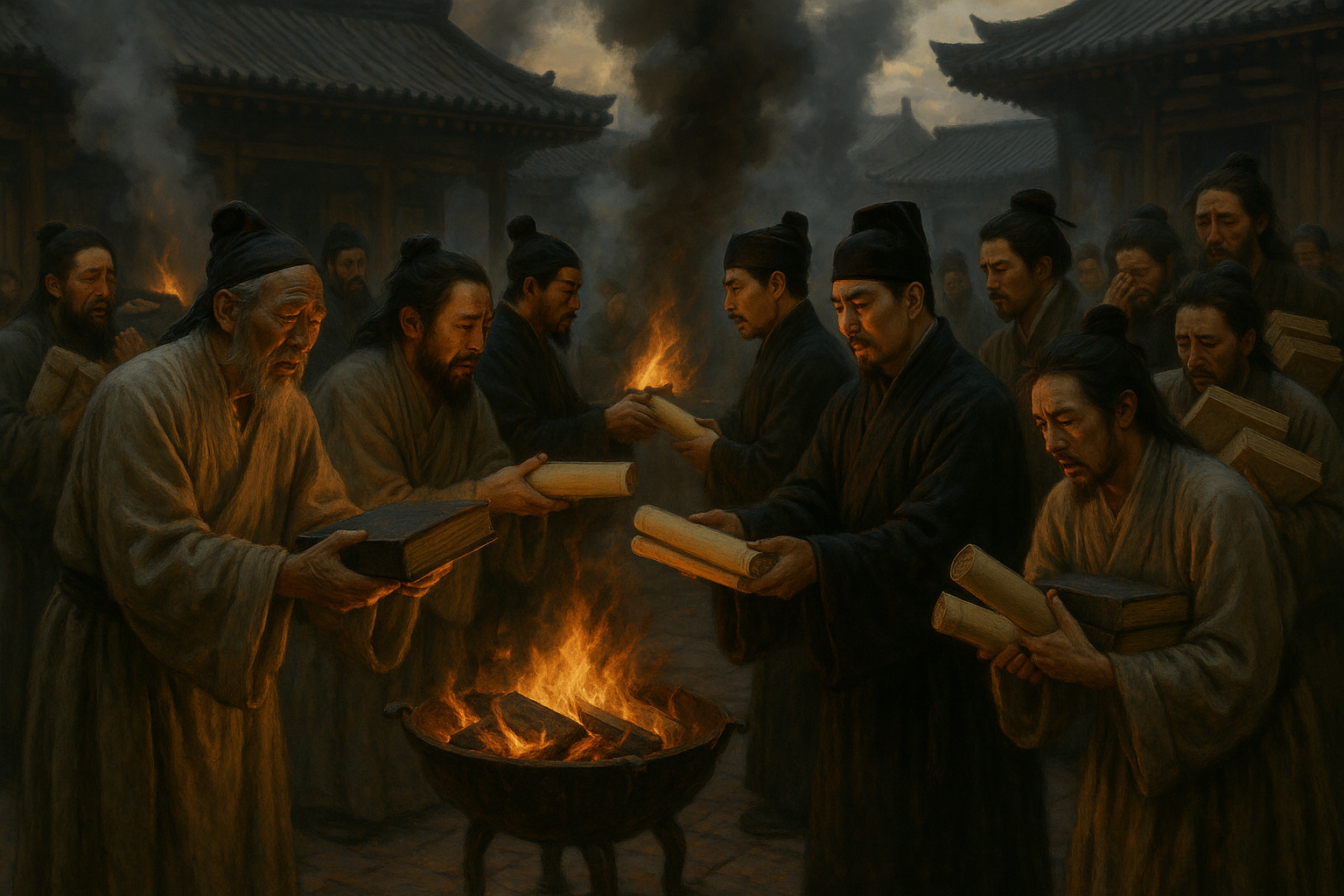From Our Favorite Historical Parallel Brother — Shamus Gerry III
The Modern Mystery
Something chilling happened in America’s most prestigious institutions this week that would make a 2,200-year-old Chinese emperor nod knowingly from his ancient throne. While Americans debated everything from grocery prices to social media trends, CBS quietly paid Donald Trump $16 million to settle a defamation lawsuit. Columbia University handed over $221 million in a similar capitulation. These aren’t just legal settlements—they’re institutional surrenders that echo through history with terrifying precision.
The pattern is unmistakable: America’s elite institutions, once bastions of independent thought and principled resistance, are now bending the knee before they’re even threatened. It’s as if our most powerful organizations have collectively decided that survival requires submission, that principles are luxuries they can no longer afford.
But this exact scenario has played out before, in stunning detail, in ancient China. An emperor faced rebellious scholars who challenged his authority with their books, their ideas, and their stubborn refusal to conform. His solution was so brutal, so effective, that it became a template for authoritarian control that echoes through the centuries. His name was Qin Shi Huang, and his story reads like a warning written specifically for modern America.
The Time Portal
Picture ancient China in 213 BCE, during the reign of the First Emperor, Qin Shi Huang. The newly unified empire stretches across vast territories, connected by roads and governed by a single iron will. But in the capital of Xianyang, tension crackles through the air like electricity before a storm.
Walk through the imperial palace and you’d witness something that would make modern Americans deeply uncomfortable: the systematic destruction of intellectual independence. In the great courtyards, smoke rises from massive bonfires. But these aren’t burning wood or refuse—they’re consuming books. Thousands upon thousands of scrolls containing the wisdom of centuries, the poetry of ages, the philosophical debates that had shaped Chinese thought for a millennium.
The most chilling part? The scholars themselves are feeding the flames.
🔌 ENERGY INDEPENDENCE ALERT
100-Year-Old Secret Slashes Power Bills by 90%
Just like ancient Chinese scholars prepared for imperial control, smart Americans are securing energy independence. Discover the forgotten technology that could free your family from rising electricity costs.
The First Emperor hadn’t simply ordered the burning of books—he had created conditions where scholars voluntarily destroyed their own life’s work. Through a combination of rewards for compliance and terrifying consequences for resistance, he had turned China’s intellectual class into willing participants in their own cultural suicide.
The Parallel Revelation
The similarities between ancient China and modern America are breathtaking in their precision. Both societies had intellectual classes that prided themselves on independence and critical thinking. Both had institutions that served as guardians of knowledge and cultural values. And both faced authoritarian pressure that transformed these guardians into willing collaborators.

Qin Shi Huang’s strategy was brilliant in its psychological sophistication. He didn’t simply ban books—he created a system where keeping forbidden knowledge became more dangerous than destroying it. Scholars who turned in prohibited texts received rewards. Those caught hiding books faced execution, along with their families. The emperor understood that fear, properly applied, could make people destroy what they claimed to value most.
The parallels to modern America are unmistakable. CBS didn’t fight Trump’s lawsuit—they paid $16 million to make it disappear. Columbia University didn’t defend academic freedom—they handed over $221 million rather than face prolonged legal warfare. These institutions have learned the same lesson as ancient Chinese scholars: resistance is expensive, dangerous, and ultimately futile.
The Pattern Recognition
What makes this story so relevant to modern America isn’t just the surface similarities—it’s the underlying pattern that repeats throughout human history. Authoritarian leaders don’t typically seize power through dramatic coups. Instead, they create conditions where institutions voluntarily surrender their independence, where resistance becomes so costly that submission seems rational.

The First Emperor’s campaign against scholars worked because it was systematic, predictable, and offered clear incentives for compliance. Modern American institutions are facing the same choice: fight expensive legal battles with uncertain outcomes, or pay settlements that guarantee survival. The rational choice, from a purely institutional perspective, is obvious.
The Ancient Warning
Qin Shi Huang’s victory over China’s scholars was complete, but it came with a price that should terrify modern Americans. The burning of books didn’t just destroy knowledge—it destroyed the intellectual foundation that had made Chinese civilization great. Within decades of the First Emperor’s death, his dynasty collapsed, partly because he had eliminated the very thinkers who might have helped solve the empire’s problems.
The scholars who burned their own books thought they were making a pragmatic choice for survival. They were wrong. By destroying the intellectual traditions that gave their society meaning and direction, they had made their civilization vulnerable to collapse from within.
5 Things You Can Do Right Now
The scholars of ancient China had no warning. But you do. Here’s how to prepare for institutional collapse:
First, secure your food independence. When supply chains break down, those who can grow their own food survive. Start with container gardening and learn to prevent tomato worms from destroying your harvest. Even small-space growing can provide crucial nutrition when grocery stores fail.
Second, master survival finance. Digital banking systems are vulnerable to both cyber attacks and government control. Learn 10 ways to manage money when everything goes offline – from keeping cash reserves to building barter networks that function without banks.
Third, learn essential food procurement skills. When modern food systems collapse, traditional skills become lifesavers. Master these 10 tried and true fishing methods that work without modern equipment. Protein procurement could mean the difference between thriving and merely surviving.
Fourth, build health independence. When healthcare systems are compromised, natural wellness becomes critical. Discover why most turmeric supplements don’t work and how to find ones that actually deliver results for natural inflammation control without relying on pharmaceutical systems.
Finally, strengthen your natural energy systems. Institutional collapse is exhausting – physically and mentally. Learn 9 natural ways to boost your energy levels using holistic methods that don’t depend on compromised healthcare or pharmaceutical systems.
🌱 Ready to Start Growing Your Own Food Security?
The 4ft Farm Blueprint shows you how to grow a year’s worth of food in just 4 square feet – even in apartments or small spaces. Perfect for beginners who want food independence without a big backyard.
Get Your 4ft Farm Blueprint Here →
When institutions crumble, the prepared inherit the earth. Don’t be caught defenseless like the scholars of ancient China.
